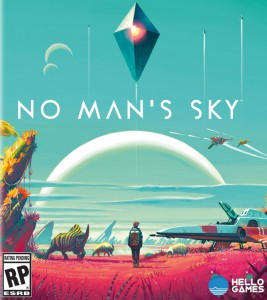No Man’s Sky: Vastness and Humanism Inhabit a Video Game

According to the World Health Organization, in 2013 the average life expectancy of a person born in Japan was eighty-four years—the highest in the world. If, somehow, a child was born in Tokyo in June of 2016, with the cognitive and physical ability to play No Man’s Sky—the latest and most daring production by indie developer Hello Games—he or she would only be able to discover and explore a scant percentage of the estimated—yes, estimated—eighteen quintillion planets that make up the game’s universe. This assumes, of course, all of the 2,650,838,400 seconds of his or her life, factoring in twenty-one leap days, of course, comes out to one newly discovered planet per second on average. Even with an entire lifetime devoted to the exploration of No Man’s Sky’s universe, a single human being can only catch a glimpse of what is offered. Furthermore, if we were being more realistic, one million players each discovering one hundred planets on average would only lead to one hundred million of eighteen quintillion being found. As a mere island, players will never begin to have a satisfying idea of the vastness which surrounds them.
The developers at the southern England-based Hello Games describe their universe as one that is infinitely and procedurally generated through deterministic algorithms and random number generators. This allows for everything perceived in the game to be generated in real time, not beforehand, thus allowing for its massive size. Any mountain on any planet can be climbed, any planet or star in the sky can be travelled to, and warp speed can be used for longer journeys. In a sense, the developers put into motion a big bang, and let the laws of physics and evolutionary biology take over to bring to life species that are always unique, along with planets that are never the same with their own ecosystems and weather patterns. Bearing this in mind, it seems to be no exaggeration to say No Man’s Sky is one of the most impressive technological feats of the twenty-first century so far.
There’s also a strikingly humanist theme coursing throughout the game. (And here is as good a place as any to note that whoever chose the name of the game oddly went with the dated reference to “man” rather than expanding to directly reference all humans.) While there is not so much of a coherent story—although players who truly enjoy the challenge of surviving the game’s harsh atmospheres, landscapes, and lifeforms will try and trek towards the center of the universe, where developers say survival becomes exponentially more difficult—the heart of the project is discovery and exploration. Whenever a player comes across a planet which has yet to be seen by anyone, they will be able to give it a name, and, more intriguingly, possess the planet’s coordinates so they can revisit at their leisure. With the online feature, players can upload the coordinates to the Atlas, to be seen by anyone else playing, who can then travel there as well. The name initially chosen for the planet will be on the Atlas permanently, letting individual players make their own mark on the universe. This is not all, however. Currency—called units—can be earned from each uploading, which can be used to buy new tools or starships, and resources gathered from the planets can also be put to such use, although stealing resources could land a player in trouble and a fight for their lives from computer-generated aliens.
As has been mentioned, some of the undiscovered planets contain voluminous flora and fauna. These can also be named, catalogued, and uploaded to the Atlas. A player is rewarded for the furthering of knowledge in the universe, not just for meandering explorations.
The true value of No Man’s Sky lies in something both incredibly simple and breathtaking. The point of the game is to discover and share knowledge with the other inhabitants of the universe. It’s almost as if the developers took the Enlightenment-era Encycloédie and turned it into a science fiction video game; a true testament to the best qualities and powers of the Information Age. While the sheer size may overwhelm some or risk boredom for others, players shouldn’t ignore the larger insight: that our discoveries outlast us all, and are continually built up higher and higher into something grander. There may well be intense competition as to who can discover the most planets or catalogue the most lifeforms, or skirmishes that leave the defeated players frustrated, but as was noted by the long lifespan of the average Japanese citizen, any one player’s impact would hardly make a dent. Only with everyone sharing information with everyone else does a fuller picture begin to come into view, and every individual, given the game’s size, is guaranteed to leave their mark. It is at once a stunning technological achievement as well as a beautiful message of boundless discovery.
